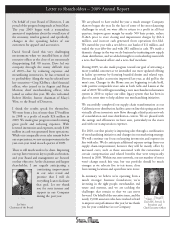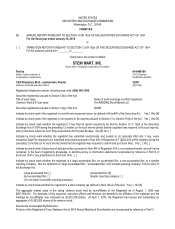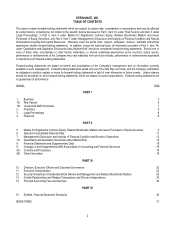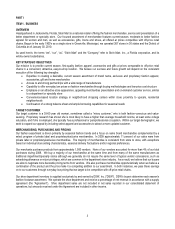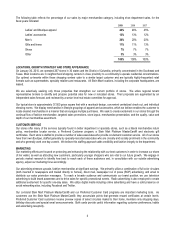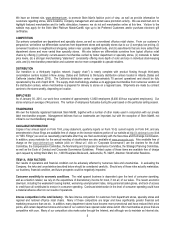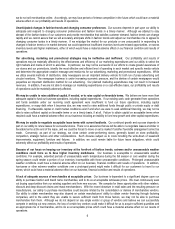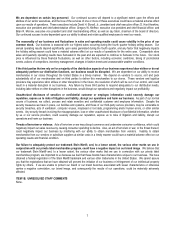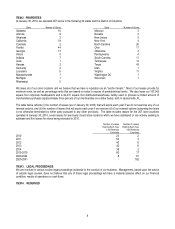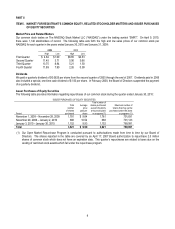Stein Mart 2009 Annual Report Download - page 5
Download and view the complete annual report
Please find page 5 of the 2009 Stein Mart annual report below. You can navigate through the pages in the report by either clicking on the pages listed below, or by using the keyword search tool below to find specific information within the annual report.PART I
ITEM 1. BUSINESS
OVERVIEW
Headquartered in Jacksonville, Florida, Stein Mart is a national retailer offering the fashion merchandise, service and presentation of a
better department or specialty store. Our focused assortment of merchandise features current-season, moderate to better fashion
apparel for women and men, as well as accessories, gifts, linens and shoes, all offered at prices competitive with off-price retail
chains. Begun in the early 1900’s as a single store in Greenville, Mississippi, we operated 267 stores in 30 states and the District of
Columbia as of January 30, 2010.
As used herein, the terms “we”, “our”, “us”, “Stein Mart” and the “Company” refer to Stein Mart, Inc., a Florida corporation, and its
wholly-owned subsidiaries.
KEY STRATEGIC OBJECTIVES
Our mission is to provide current season, first-quality fashion apparel, accessories and gifts at prices comparable to off-price retail
chains in a convenient, attractive, easy-to-shop location. We believe our success and future growth will depend on the consistent
execution of the following key strengths:
x Expertise in creating a desirable, current season assortment of brand name, exclusive and proprietary fashion apparel,
accessories, gift and home merchandise
x Access to and strong partnerships with a wide range of manufacturers
x Capability to offer everyday low prices on fashion merchandise through buying methodologies and low-price cost structure
x Emphasis on an attractive store appearance, appealing merchandise presentation and on-demand customer service, similar
to a department or specialty store
x Convenience-based location strategy in neighborhood shopping centers within close proximity to upscale, residential
neighborhoods
x Continuation of a strong balance sheet and ample borrowing capabilities for seasonal needs
TARGET CUSTOMER
Our target customer is a 35-60 year old woman, sometimes called a “missy customer,” who is both fashion-conscious and value-
seeking. Proprietary research has shown she is most likely to have a higher than average household income, at least some college
education, and if she is employed, she typically has a professional or paraprofessional occupation. Within our target demographic, we
seek to expand our appeal by including select apparel and accessories to attract a more updated customer.
MERCHANDISING, PURCHASING AND PRICING
Our fashion assortment is driven primarily by seasonal fashion trends and a focus on name brand merchandise complemented by a
select program of private label and proprietary/exclusive merchandise. In 2009 approximately 11 percent of our sales were from
private label or proprietary/exclusive merchandise. The majority of merchandise is consistent from store to store, with exceptions
based on individual store selling characteristics, seasonal delivery fluctuations and/or regional preferences.
Our merchants purchase products from approximately 1,500 vendors. None of our vendors accounted for more than 4% of our total
purchases during 2009. We buy a majority of our merchandise at the same time and from many of the same manufacturers as
traditional department/specialty stores although we generally do not require the same level of typical vendor concessions, such as
advertising allowance or return privileges, which are common in the department store industry. As a result, we believe that our buyers
are able to negotiate more favorable pricing terms from vendors. We also purchase merchandise opportunistically when we believe a
combination of the product and the price make it a compelling addition to our assortment. In both instances, we pass these savings
on to our customers through everyday low pricing that we target to be competitive with off-price retail chains.
Our shoe department inventory is supplied exclusively by and owned by DSW, Inc. (“DSW”). DSW’s buyers determine each season’s
fashion footwear assortment. We operate the shoe department and receive a percentage of net revenue in accordance with a supply
agreement (the “Agreement”). Shoe department sales are not included in net sales reported in our consolidated statement of
operations, but amounts received under the Agreement are included in other income.
3


